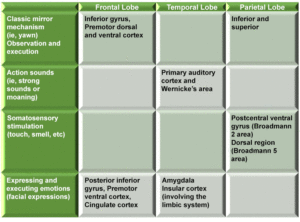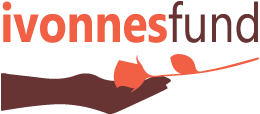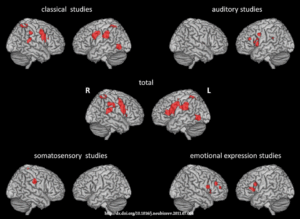by Dr. Marcel Pontón
Our sixth grade teacher put us in timeout for ditching his class the previous day. He had promissed the principal that he would use the incident to teach us a lesson. During class, he annoyed us by keeping us in absolute silence and inactivity. We saw him yawn and we started yawning as well. Sluggishness had suddenly possessed us as if we were fatigued. Then he grabbed a lemon and observed it for a few minutes before he cut it. He took a bite, as if eating any piece of fruit. His facial expression caused us all to believe we tasted the same sour lemon, even though we didn’t even touch it.
It wasn’t until a few years ago that I finally learned the lesson my sixth-grade teacher was trying to teach us. I realized he gave us a master lecture on the subject of mirror neurons.
What are the mirror neurons?
I challenge you to look at the following photos during 5 seconds each (hover over the image to see the navigation arrows). Notice what happens to your face and ask yourself what do you feel when you look at them:
[su_carousel source=”media: 384,387,385,389″ width=”500″ height=”600″ items=”1″ autoplay=”0″]
If you are asking yourself why are you feeling the emotions that you see, it means that your neural circuitry became engaged with these images and triggered a reaction. Your mirror neurons are doing their job.
Where are the mirror neurons located?
Neuroscience tells us that there are several circuits in the brain that become activated with imitation responses. As a result, there has been an increased interest in the study of empathy in social situations. In fact, several studies exploring the vicarious experiences of disgust, pain, reward and joy (Enger and Singer, 2012), have led us to adopt the theory that the same neural networks activated during the actual experiences are also triggered when we react with our mirror neurons. The most studied subject is that of empathy as well as the realtionship between the individual and the object of that empathy (e.g., valuing the other person).
Pascal Molenberghs et. al. (2012) summarize their findings from 125 neuroimagery studies focusing on the areas of the brain that contain mirror neurons. As you might expect, different regions of the brain and different neural networks are activated depending on the response. The conclude that vicarious brain activity made possible by mirror neurons extends beyond actions to include sharing of emotions and sensations of others as well. The following image shows a visual map of the brain regions containing mirror neurons; the summary table identifies each of these areas:

Implications of the mirror neurons
There are many known benefits of using our mirror neurons to help others. Science demonstrates that helping others brings us happiness (even during childhood), helps us lower our blood preassure, and prolongues our lives. But it also gives us a sense of greater purpose and satisfaction.
Several studies link the absence of empathy to people who have committed crimes, are sociopaths, autistic or who suffer from alexithymia (inability to feel). In each of these cases, there is clear evidence of malfunctioning of, or a smaller amygdala deficiency that impairs the mirror response.
For most of us, helping others results in benefits to the other person, and to us. As Jesus said, “You’re far happier giving than getting.” I challenge you to be sensitive and to pay attention to your mirror neurons.
Personally, I have been deeply moved with Ivonne’s story. She is a dear friend, mother and wife who suffers from Polycystic Kidney Disease, PKD. Over the past few years, her kidneys and liver have progressively lost their ability to function due to multiple cysts (fluid sacs) that have taken over those organs and grown uncontrollably. This has caused preasure to other vital organs as well. Being a genetic disease, the best-known solution to date is a dual organ (liver and kidney) transplant. Ivonne is a candidate to get a transplant this year. It is no secret we are dealing with a life or death situation here. As it often happens with chronic illnesses, Ivonne’s family does not have enough resources to cover her proper treatment.
This is where my mirror neurons kicked in and moved me to help. You can also help if you know her story. Here you will find Ivonne’s story with practical ways to get involved.
Do not withhold good from those to whom it is due,
when it is in your power to act – King Solomon.
Text republished with permision from the author; originally published at marcelponton.com.








